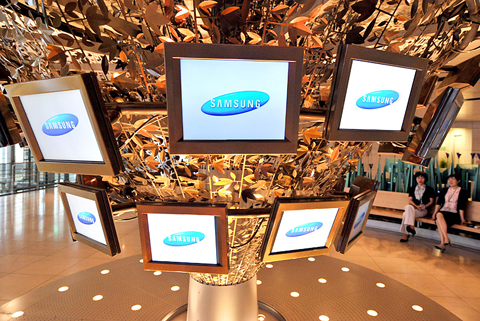Samsung Electronics, the world’s largest manufacturer of flat screen televisions, memory chips and liquid crystal displays, posted its first ever quarterly loss yesterday as the global economic slump hit prices and demand for mainstay products.
Samsung lost 20 billion won (US$14.37 million) in the three months ended on Dec. 31, the company said in a statement. Samsung posted 2.21 trillion won in net profit a year earlier.
The net loss was Samsung’s first since the company began reporting results on a quarterly basis in 2000 and underlines the challenges facing electronics companies worldwide as major economies flounder in recession.

PHOTO: AFP
The Suwon, South Korea-based company has struggled with falling prices for chips and flat screens, as well as the waning consumer appetite that has hit other Asian electronics manufacturers including Japanese giant Sony Corp.
On Thursday, Sony projected its first annual loss in 14 years, while South Korea’s LG Electronics Inc reported a record quarterly net loss. Japan’s Panasonic Corp said earlier this month it would slash about US$1.5 billion from its planned investment in two new flat-screen TV plants and shut down unprofitable businesses.
The results showed that “our company could not escape the rapid decline in the global economy,” Samsung’s Robert Yi, vice president for investor relations, told a conference call.
The result wasn’t as bad as the net loss of 92.93 billion won forecast by an Associated Press survey of 10 analysts. But on an operating basis, the company racked up red ink to the tune of 940 billion won, much worse than the forecast of a loss of 319 billion won. That loss was also a first.
Operating earnings are seen as a direct indicator of core business performance, while net profit or loss also reflects taxes, dividends, asset sales and other items.
“The global economic slowdown had an adverse effect on consumer purchases of electronics goods in the fourth quarter, traditionally a strong period for electronics companies,” Samsung said in the release.
Fourth quarter sales rose to 18.45 trillion won from 17.48 trillion won the year before, but less than the 20 trillion won expected by analysts.
Samsung shares fell 3.5 percent to 445,000 won in afternoon trading. The company announced results less than one hour after the stock market opened.
On the bright side, Samsung said mobile phone sales rose to a record during the quarter despite a 5 percent contraction in the global market for handsets. The company is the world’s No. 2 mobile phone manufacturer.
Samsung announced a major restructuring last week, consolidating business operations into two divisions. This week the company said it had replaced most of the heads of its overseas regional headquarters.
It also announced the redeployment of more than 80 percent of the almost 1,400 employees at its Seoul headquarters.

STILL COMMITTED: The US opposes any forced change to the ‘status quo’ in the Strait, but also does not seek conflict, US Secretary of State Marco Rubio said US President Donald Trump’s administration released US$5.3 billion in previously frozen foreign aid, including US$870 million in security exemptions for programs in Taiwan, a list of exemptions reviewed by Reuters showed. Trump ordered a 90-day pause on foreign aid shortly after taking office on Jan. 20, halting funding for everything from programs that fight starvation and deadly diseases to providing shelters for millions of displaced people across the globe. US Secretary of State Marco Rubio, who has said that all foreign assistance must align with Trump’s “America First” priorities, issued waivers late last month on military aid to Israel and Egypt, the

‘UNITED FRONT’ FRONTS: Barring contact with Huaqiao and Jinan universities is needed to stop China targeting Taiwanese students, the education minister said Taiwan has blacklisted two Chinese universities from conducting academic exchange programs in the nation after reports that the institutes are arms of Beijing’s United Front Work Department, Minister of Education Cheng Ying-yao (鄭英耀) said in an exclusive interview with the Chinese-language Liberty Times (the Taipei Times’ sister paper) published yesterday. China’s Huaqiao University in Xiamen and Quanzhou, as well as Jinan University in Guangzhou, which have 600 and 1,500 Taiwanese on their rolls respectively, are under direct control of the Chinese government’s political warfare branch, Cheng said, citing reports by national security officials. A comprehensive ban on Taiwanese institutions collaborating or

France’s nuclear-powered aircraft carrier and accompanying warships were in the Philippines yesterday after holding combat drills with Philippine forces in the disputed South China Sea in a show of firepower that would likely antagonize China. The Charles de Gaulle on Friday docked at Subic Bay, a former US naval base northwest of Manila, for a break after more than two months of deployment in the Indo-Pacific region. The French carrier engaged with security allies for contingency readiness and to promote regional security, including with Philippine forces, navy ships and fighter jets. They held anti-submarine warfare drills and aerial combat training on Friday in

COMBAT READINESS: The military is reviewing weaponry, personnel resources, and mobilization and recovery forces to adjust defense strategies, the defense minister said The military has released a photograph of Minister of National Defense Wellington Koo (顧立雄) appearing to sit beside a US general during the annual Han Kuang military exercises on Friday last week in a historic first. In the photo, Koo, who was presiding over the drills with high-level officers, appears to be sitting next to US Marine Corps Major General Jay Bargeron, the director of strategic planning and policy of the US Indo-Pacific Command, although only Bargeron’s name tag is visible in the seat as “J5 Maj General.” It is the first time the military has released a photo of an active